![]()
The Words of the Kamar Family
|
|
The Words of the Kamar Family |
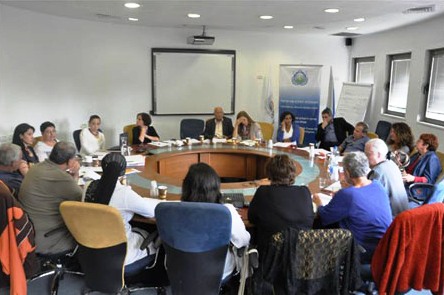
Arugot, Israel -- Religious leaders, scholars, peace and social activists gathered on Oct. 21 in the president's office of Achva College for a forum on "Parity and representing the diversity of Israeli society, having Professor Alian El-Kranawi from the Bedouin town Rahat as the president, a religious Jewish woman as the rector, and Arab and Jewish women in the senior dean's office.
The current meeting organized by UPF's Jerusalem Office for Interfaith and Cooperation among Religions was dedicated to the subject of Parity and Equality in Family and Society and started with warm welcoming remarks by Dr. Eti Gruvglad, the rector of Achva College; she was followed by greetings of the President of the Jerusalem interfaith forum, Sheik Ali Birani, and of Secretary-General of UPF-Israel, Mrs. Miri Kamar.
Dr. Nurit Hirschfeld, director of the forum, opened the discussion with reading texts from "The Love of a True Husband and a True Wife" by UPF founder, Dr. Sun Myung Moon:
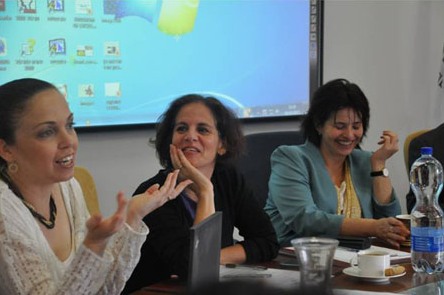
Since love comes from my spouse, I must bow my head and serve her. This is where the heavenly principle of living for the sake of others originates. When something highly noble comes to me, I must honor and serve it in order to receive it. We must live the philosophy of living for the sake of others…. A true husband is a person who says, "Since I am born for your sake, I will live for you and die for you." It is the same with a true wife. If such a couple has a family where they are well suited to each other and live for each other's sake, going beyond their own selves, this family will inevitably become an ideal family, a family of happiness, and a family of peace.
Dr. Hirschfeld asked about the relevance of "Parity and Equality in Family" to the issue of inter-religious discussion and to the higher goal of peace in society. Arguments about the equal value that religion offers women were heard from rabbinith Esther Bar-Dea, wife of the Sephardic chief rabbi of Ramat-Gan city, and by Sheik Halil Elbaz, imam of the Bedouin city of Tel-Sheva.
Mrs. Sana Elbaz, wife of Sheik Halil Elbaz, who was one of 12 honorees lighting ceremonial torches in the annual ceremony to mark the beginning of Israel Independence Day, expressed her belief that "I, as a woman, should take the rights for myself, I shouldn't wait for anyone to give it to me. It is in my hands." She added that in spite of the tendency among Bedouins to discriminate against women, many women are starting to change, finding fulfillment and making great contributions to their society and families.
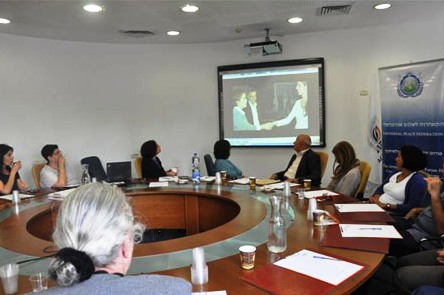
Mrs. Amira Basul from the dean's office of Achva College said that while the situation of women in western society is problematic, the situation of the women in Arab society is much more difficult. In response to Mrs. Sana Elbaz, she said that Sana can talk the way she talks thanks to the support she receives from her husband, Sheik Halil. Sana agreed that her supportive husband played an important role. Mrs. Amira Basul also expressed gratitude for her own supportive family who give her the freedom for personal development.
Mrs. Miri Kamar referred to the texts about the value of love that were read at the opening of the session. True love in the family is achieved when the husband and wife mutually live for the sake of each other; when they respect and honor each other's value, which was given to them by God who created them in his image. In this way their mutual value is enhanced and strengthens the flow of love in their family.
Mrs. Kamar referred to the important question that Dr. Hirschfeld raised about the relevance of equality to peace in society. If we value our family members by devoting ourselves to them, we will also learn to do the same in our society, nation and the whole world. We can build peace with the stones of mutual love and respect.
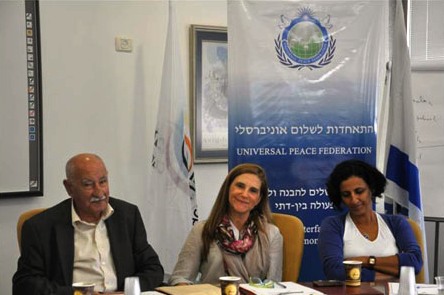
Concerning the current position of women in society, Dr. Noach Hayut, director of the Herzog Center for Jewish Studies, claimed that women still need to pave their way struggling with the glass ceiling (which sometimes, according to Dr. Hayut, is not even a glass ceiling, but rather a very clear and visible one). Apart from the social elements of the inequality of women Dr. Hayut pointed to the field of religious ritual and religious laws, where much progress still needs to be made: "Among the leadership of the religious Zionism Movement this issue is highly discussed. There is a growing awareness of the need for a change in this aspect. with a conscious and intentional activity to find a way to create this change."
Rabbi Yaakov Luft, who is working in education of Jewish communities in Europe has shared with the forum some of the philosophical and theological aspects of the religious Zionism Movement to create this change. In Judaism there is the term Tikun Olam (repairing the world), which implies that the world is not complete, and that we should strive to advance, to fix society, fix the world, and not to withdrawn by preserving traditions from the past.
An interesting gap between the original ideal and the reality of society was expressed by the Druze representative at the forum, Sheik Samih Natur, the editor of the first Druze encyclopedia. Sheik Natur said that according to the religious teachings of the Druze, women have equal rights, and a woman can even become religious leader if she embodies all the necessary moral virtues. In reality, however, women in the Druze society have suffered throughout the age from the patriarchal mechanism of the society around them; thus women were oppressed.
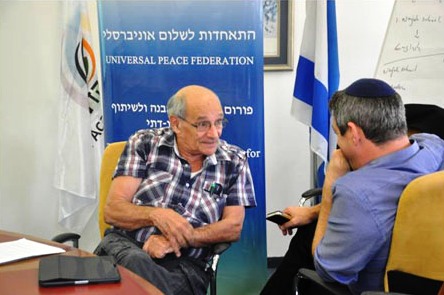
Another aspect of the issue was brought up by Mrs. Aliza Hoshen, an organizational consultant, who shared the internal course she had gone through: from rebellion against the patriarchal model of her parents, through building her own prosperous career, to the realization that she is not willing to pay the price that such a career demands upon her role and responsibility as a mother. Mrs. Osnat Lazar, an art therapist, expressed the sad reality that the family no longer plays the important and expected role supplying confidence in an unconditional protection to the individual. Mrs. Irit Nuriel, from the dean's office of Achva College, lamented the deterioration in basic moral values such as "loving your neighbor as yourself."
Mr. Alon Shuster, the Regional Council Chairman of Shaar Ha-Negev (an area that suffers from rockets launched from the Gaza Strip), called on people to acknowledge the equality in value of human life regardless of gender, nationality or religion, in addition to acknowledging the differences among them. "The essential challenge is to identify in which fields inequality is correct because of the different needs of each sector in the population and in which fields inequality is wrong and should be corrected," he said.
Some of the women shared personal experiences. Mrs. Rut Reizel, a former counselor at the Beit Berl Academic Institute, said that a woman's power is a modest. "You should make your husband a king, while you are the biggest diamond on his crown," she advised. She then gave a moving example of a Jewish mother whose son was killed in a terror attack. This mother donated her son's heart to a Palestinian child. "Due to her motherly love she overcame revenge and resentment. She saved life, and because of this heart, her son continued to live," she said.
Another moving testimony was given by Mrs. Amira Basul, who was wrongly identified by a terrorist as a Jew and was stabbed by his knife while walking along the streets of Jerusalem. She was in her eighth month of pregnancy, and for the final month before the delivery she had to lie in hospital bed to ensure her healing and to assure the baby's condition was stable. After the delivery, Amira went to meet this terrorist and told him that she forgave him. "The power of forgiveness is great," she said. "After I did that, I cannot be angry. I am not a slave to bitter feelings. I am free from resentment, and it is a good feeling," she concluded.
In conclusion, 21 participants, from various aspects of society joined the thought-provoking discussion: Jewish, Muslims, Druze and Christians; Orthodox, moderate religious and secular people; people from Haifa in the north to Beer Sheva in the south and from Jerusalem on the east to Tel Aviv in the west. Participants included men and women, grandparents and grandchildren, and parents with young children, people from the villages and people from the city. They expressed a common concern for the future of the nation and an honest will to create a better society. Rising above the disagreements, they created an atmosphere of unity based not on opinions but on the mutual will of the heart.